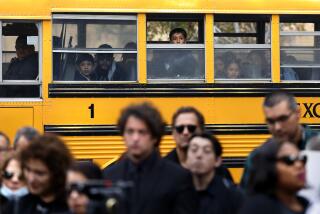Are Yuppies Adults? : GROWN-UPS: A Generation in Search of Adulthood <i> by Cheryl Merser (G.P. Putnam’s Sons: $17.95; 237 pp.) </i>
- Share via
“Grown-Ups” demonstrates that Cheryl Merser has a nice, breezy writing style and a good deal of intelligence and heart. It’s a pity, then, that she has such a solipsistic conception of her subject matter.
Subtitled “A Generation in Search of Adulthood,” “Grown-Ups” is ostensibly about how the huge mass of people born during the post-war baby boom is redefining adulthood. In fact, it’s an extended personal essay that is more about Merser and her friends and acquaintances than anything else.
Periodically, the author opens her lens wide enough to shed light on the sociological, economic and demographic forces that have shaped her generation; and it’s when she takes the long view by putting these forces into their proper historical perspective that she is most genuinely illuminating.
Throughout the book, Merser also goes off into discussions of the views on life-cycle development put forth by such heavy-weight thinkers as William James and Carl Jung, as well as the now-outdated theories popularized in Gail Sheehy’s “Passages”--theories whose obvious inapplicability to the present generation of young adults seems to have hit Merser as a great surprise. Although sometimes they sound forced and academic, these sections at least prove the author has done her library homework.
But none of this makes up for the fact that too much of “Grown-Ups” is devoted to telling often trivial anecdotes about Merser and her friends, all of whom sound like nice enough people, but none of whom come off as interesting enough to warrant or sustain so much attention.
Had Merser gone out and conducted some interviews--including some with people of her age (about 36) but from different backgrounds--”Grown-Ups” certainly would have wider appeal. The author would then have also been able to test out her main premise, which is that baby boomers don’t feel like real adults because so many are leading lives that bear little or no resemblance to the married, middle-class, suburban model led by their parents.
This premise is accompanied by another untested assumption, namely that as the baby-boomers’ parents were rearing their children, they felt like real adults themselves. My guess is that the reality for both generations is far more complex.
More to Read
Sign up for our Book Club newsletter
Get the latest news, events and more from the Los Angeles Times Book Club, and help us get L.A. reading and talking.
You may occasionally receive promotional content from the Los Angeles Times.










